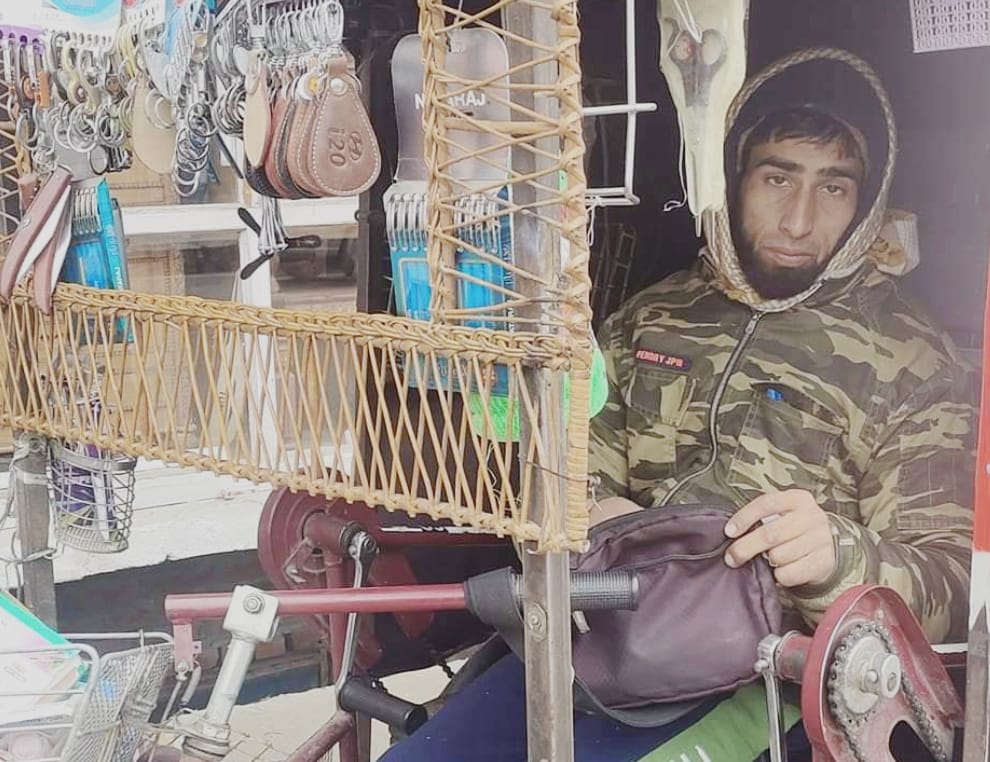
Meer Irfan
Mohammed Iqbal Ganie, a street vendor from Srinagar, was brutally assaulted by an unidentified person on Saturday.
ALSO READ: Viral video scapegoating auto-rickshaw drivers may fuel classist hate in Kashmir
The incident occurred while Iqbal, a physically handicapped man, who sells various small items on a tricycle, was plying his trade in the Lal chowk area of the city.
According to Iqbal, the assailant, who was driving a car, began honking incessantly despite having ample space to pass. When Iqbal did not move immediately, the driver exited his vehicle, verbally abused Iqbal, and then proceeded to beat him, blaming him for obstructing traffic.
Iqbal, who hails from Damhal Hanjipora in Kulgam but currently resides in Srinagar, is the sole breadwinner for his family of eight members.
In 2017, he managed to save enough money to perform Umrah, despite his meager earnings from selling items like pens, masks, key holders, nail cutters, and perfumes on his tricycle.
Speaking to the media, Iqbal recounted the harrowing experience: “On Saturday, while I was selling a few things on my cart, a car stopped behind my bicycle and started honking constantly, even though there was plenty of space on the other side of the road. The person in the car got out and started abusing me for occupying the road, and then began assaulting me.”
Iqbal stated that the attacker, who was driving a large vehicle, abused him and other street vendors for contributing to traffic congestion, and told him to rather stay at home. The assault has left Iqbal traumatized and he is seeking action against the unidentified assailant.
This incident follows a recent report by The Kashmiriyat about a video that gained significant traction on social media, amassing over 100,000 views on Facebook.
The video features a person in a car blaming auto-rickshaw drivers for traffic jams in the city, while ignoring other vehicles such as motorcycles and scooters that also contribute to congestion.
The video highlights how social media can perpetuate violence against the poor, reinforcing societal inequalities and dehumanizing vulnerable populations.
Iqbal’s incident is not the first. In recent times, there has been an alarming trend of officials initiating punitive actions against street vendors under the guise of “decongesting” urban spaces. These actions, widely publicized on social media, often depict officials forcefully removing vendors, confiscating their goods, and dismantling their makeshift stalls. These vendors, who are primarily local residents struggling to make ends meet, find their livelihoods abruptly disrupted.
While we may express temporary outrage and sorrow upon seeing visuals of these street vendors facing such harsh actions, we must acknowledge our own complicity in this cycle of violence. By endorsing and sharing content that blames the poor for urban problems, we perpetuate a culture of animosity towards them.
This digital complicity normalizes the marginalization and dehumanization of the working class. Instead of challenging these narratives and advocating for more inclusive and equitable urban policies, we often remain passive observers, indirectly supporting the systemic violence against the poor.
Our silence and inaction contribute to the continued oppression of those who are already struggling to survive amidst rising inflation and economic hardships.




